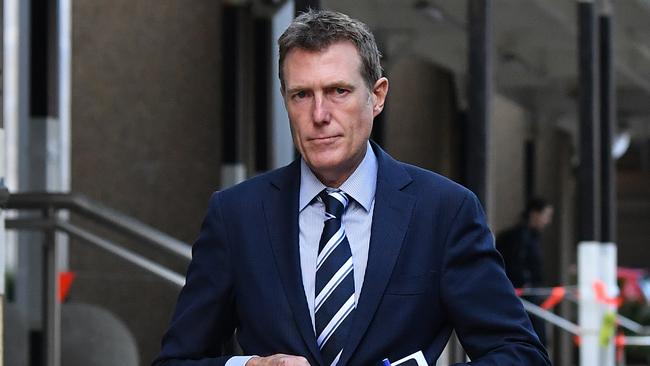Christian Porter appeal rejects conflict
Christian Porter’s legal team have emphatically rejected claims his barrister could have used confidential information in her defence of the former Attorney-General.

Christian Porter’s legal team has emphatically rejected claims his barrister could have used confidential information in her defence of the former attorney-general, saying the decision to disqualify his lawyer was odd and improper.
Mr Porter is appealing a decision to pay more than $400,000 in legal costs to Joanne Dyer, the friend of a deceased woman who had accused him of raping her three decades ago, after a court ruled there was a conflict of interest in the case.
Last May, Mr Porter launched legal proceedings against the ABC after the broadcaster published a story concerning an unnamed cabinet minister accused of a historical alleged rape.
Ms Dyer, who appeared on an ABC program concerning the allegations, told the Federal Court she had met with Mr Porter’s then-lawyer Sue Chrysanthou to discuss legal action against The Australian over an article relating to her appearance on the program.
She argued Ms Chrysanthou should be barred from acting for Mr Porter because she was privy to confidential information disclosed by her and another witness, Macquarie banker James Hooke, before she was engaged to act on his behalf
At the time, Justice Tom Thawley ordered the high-profile silk to relinquish the case, saying she had received secret information that could present a “danger of misuse”. Three days later Mr Porter dropped his defamation case against the ABC.
On Wednesday, Mr Porter’s appeal challenged the claim Ms Chrysanthou was aware of confidential information which could affect the defamation case against the ABC.
Bret Walker, SC, acting on behalf of the former cabinet minister, argued Ms Chrysanthou was obliged to take Mr Porter’s brief because of the cab-rank rule, adding that she should not be expected to refuse cases based on past professional relationships.
“What matters is whether that disclosure in conference of that information is or may be the means by which the lawyer [Ms Chrysanthou] … would later be able to deploy that information in the later proceedings in question,” he told the Federal Court.
He added: “Mr Porter is obviously somebody to whom [Ms Dyer] has exhibited a high level of disapproval … [and] wishes him ill to put it bluntly.”
Ms Chrysanthou’s lawyers argued she could not recall discussing any confidential material and that she had not breached any ethical standards.
Michael Hodge, QC, acting for Ms Dyer in Wednesday’s proceedings, said Mr Porter’s submissions concerning the confidentially of the meeting contained a “bizarre and perverse” logic which he dismissed as “simply wrong”. Mr Hodge argued his client had not agreed that confidential information could be used by Ms Chrysanthou, noting that consent was fundamental to the integrity of the legal profession.
Mr Porter has since settled the case with the broadcaster with no damages paid.
An attempt to lift suppression orders on the case failed.



